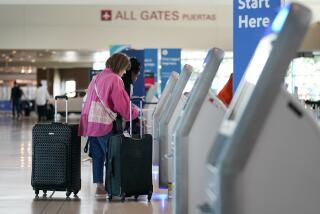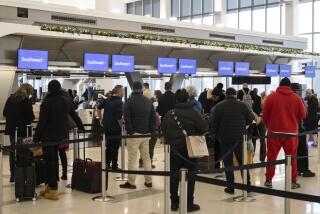Closing the ‘open skies’
- Share via
THOSE WHO DIDN’T GET THEIR fill of protectionism from Congress last month should take heart. The Dubai Ports World deal may be dead, but the cause lives on in the seemingly unrelated world of airline regulation. Now Congress has decided it needs to “protect” U.S. airlines from foreign control. In reality, it may be preventing domestic airlines from getting something they sorely need: capital.
Washington’s latest protectionist imbroglio couldn’t come at a worse time for the airline industry. After years of negotiations between European and U.S. officials, both sides are poised to adopt a crucial “open skies” treaty that would erase decades-old limits on service across the Atlantic, which help shield airlines from international competition and drive up fares on many routes between the U.S. and Europe. European Union officials say they will adopt the treaty in June, but only if the U.S. relaxes a 1938 law that keeps foreigners from owning no more than 25% of an airline’s voting stock.
The Bush administration agreed to make minor changes. Then Congress got wind of it. Airlines could be controlled by “competing -- and potentially unfriendly -- foreign interests” that could undermine domestic security, said Rep. Frank A. LoBiondo (R-N.J.). Rep. Bob Ney (R-Ohio) speculated that airlines would outsource jobs: “I personally know how frustrating it is when you call to change your reservation and you are talking to someone in India.”
From these comments and others like them, one might think that Europe was preparing to recolonize the U.S. by buying up its airlines. But the foreign-ownership rule is long overdue for an overhaul; it’s even more necessary now that the landmark open skies deal depends on it. Besides, the administration proposal doesn’t even call for removing the 25% cap, which would certainly be justified. Instead, it would merely allow foreigners to hold some senior management positions that oversee only economic decisions, such as setting fares and buying planes. In essence, the administration rightly wants to give noncitizens who invest in U.S. airlines more say in how their money is spent. The administration’s proposal makes clear that decisions about security matters would remain firmly in the hands of U.S. citizens.
Still, Rep. James L. Oberstar (D-Minn.) in December introduced a bill that would stop the administration from going forward. Upon introduction, the bill had about 60 co-sponsors; as of Tuesday, it had 180, including 50 that signed on after Congress started objecting in February to the Dubai Ports deal.
Two major airlines are in bankruptcy and bleeding cash. Delta Air Lines could stop flying for good by the end of the month if its pilots make good on their strike threat. Congress needs to temper its election-year enthusiasm for protectionism with the realization that, like it or not, the U.S. competes in a global economy. And airlines -- businesses that are worldwide in scope -- need all the access to capital they can get.
More to Read
Sign up for Essential California
The most important California stories and recommendations in your inbox every morning.
You may occasionally receive promotional content from the Los Angeles Times.













